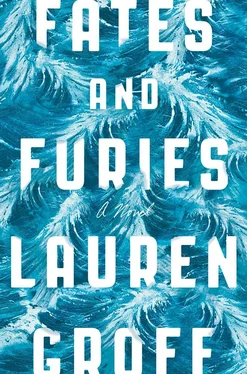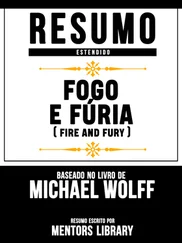He moved to the door, but Lancelot, trying to find a way to keep him, said, “How did you know I’d be awake?”
Lancelot could feel the heat of Leo’s blush from where he was standing. “I know you,” he said. And then, recklessly: “I can’t tell you how many mornings I’ve stood on the road and watched your light go on at five twenty-two before I could go home to sleep.” And then the door opened, closed, and Leo was a scribble disappearing on the dark path and then the blank page of snow.
—
LANCELOT APPLIED DEODORANT TWICE, shaved twice. All parts of him had been scrubbed in the hot shower. He watched himself closely in the mirror, unsmiling. It was nothing, his collaborator playing the first music for their project; it was business, routine; he was nauseated, hadn’t eaten a thing all day; his limbs were wrong, as if his bones had melted and been reconstituted at random. The last time he’d felt this way, he had been so young he was a stranger to himself, and there had been a girl with a moon face and self-pierced nose, a night on the beach, a house they were in going up in flames. His first completed act of love. So nervous, he forgot her name for a minute. [Gwennie.] Oh, yes, Gwennie, his memory fraying at the edges, so unlike the old him with the steel-trap brain. Though what her ghost had to say to him could not be pertinent here.
Something was happening inside him. As if inside there were a blast furnace that would sear him if opened. Some secret so unacknowledged not even Mathilde knew.
He hadn’t wanted to put his visit to Leo’s into words that Blaine could hear, so he’d made the soup himself and the sandwiches, packed them in the basket. He set out totteringly over the melting ice without telling anyone where he was going. In the twilight, the ice had retracted enough from the banks to resemble gums with exposed tooth roots. The trees were skinny bodies stripped bare in the wind. It was far more difficult to move than he’d thought it would be: he had to go crabwise, arms extended, basket dangling, and he was breathing heavily by the time he came to Leo’s little Tudor, with firelight reddening the windows.
He went inside for the first time and was startled by the small evidence of habitation. All had been swept clean, and the only markers of Leo were the black shoes, shiny as beetles, in a neat pair under the bed, and the music standing on the piano.
Then the sound of water from a faucet in the bathroom, and there was Leo in the doorway, drying his hands on a towel.
“You came,” he said.
“You doubted?” Lancelot said.
Leo moved toward Lancelot, then stopped in the middle of the floor. He touched his throat, then his legs, then touched his hands together at the palms. He hemmed. “I had planned that we eat first, but I don’t think I can,” Leo said. “I want so much to play for you, and at the same time I’m far too anxious to play for you. This is absurd.”
Lancelot took a screw-top malbec that he’d scavenged from the dining area out of the basket, and said, “So, we drink. Scored a Wine Advocate ninety-three. Complex, fruit-forward, with notes of bravery and wit. Whenever you feel ready, we’ll play.” He’d meant you’ll play, as in piano, and coughed to cover his mistake.
He poured into the same speckled blue mugs that, in his own cabin, he had planted a dead fern in. Leo took a gulp and choked, laughing, and dabbed at his face with a tissue. And then he handed the mug back to Lancelot, grazing his hand. He crossed over to the piano. It felt a violation for Lancelot to sit on the side of Leo’s bed, but still he sat gingerly, aware of the mattress’s coolness, the white sheets, the firmness of it beneath him.
Leo flexed his monstrous hands and, as if for the first time, Lancelot saw their unbelievable beauty. They could span a thirteenth, those hands, they were Rachmaninoff hands. Leo let them float above the keys, and they came down, and Go’s aria had already begun.
After a bar, Lancelot closed his eyes. It was easier this way, to disembody the music. Like this, he heard the sound resolve into a soft song. Soaring and harmonious. So sweet it ached his teeth. Heat began in his stomach and radiated outward, up and down, into the throat, into the thighbones, an emotion so strange Lancelot had a hard time identifying what it was; but within a minute of Leo’s playing, Lancelot had put a name to it. Dread. He was feeling dread, pale and thick. This music was wrong, so utterly and entirely wrong for their project. Lancelot felt as if he were choking. He had wanted the ethereal, the strange. Something a little ugly. Music with humor in it, for gadfly’s sake! A biting sort of music! An undermining and deepening music, one that layered with the original myth of Antigone, which had always been a ferocious and strange story. If only Leo had replicated the music from the opera this summer. This, though. No. This was treacle; this had no humor in it. It was achy; it was trembling. This was so wrong it changed everything.
Everything had been changed.
He had to make sure that his face, turned so attentively toward Leo, his eyes closed, was composed into a mask.
He wanted to escape to the bathroom to weep. He wanted to punch Leo in the nose to get him to stop. He did neither. He sat there, a Mathilde smile on his face, and listened. On his internal dock, a great ship that he had wanted to climb and sail away on gave a low blast. The ropes were tossed. It moved silently out into the bay, and Lancelot was left alone onshore, watching it dip low over the horizon, watching it vanish.
The music ended. Lancelot opened his eyes, smiling. But Leo had seen something in his face and was looking at him now, horror-struck.
When Lancelot opened his mouth but no words came out, Leo stood and opened his door and walked outside in his bare feet, without even a jacket, and vanished into the dark woods.
“Leo?” Lancelot said. He ran to the door and shouted, “Leo? Leo?” But Leo made no sound. He was gone.
They hadn’t been paying attention. On the softest of cat feet, the winter afternoon had passed into twilight.
In the cabin, Lancelot considered. He could run after Leo, with his weak left side — and say what if he found him? Say what if he missed him? He could stay inside here and wait for Leo to come back. But the boy’s pride was badly wounded, and he would very soon be physically hurt by the cold, his feet cut up, frostbite setting in before he consented to return to a cabin where Lancelot was. The only good thing, the only humane thing, was for Lancelot to leave. Allow the boy to creep back inside, lick his wounds in private. Come back tomorrow and straighten things out after they’d both had a moment to cool off.
He scribbled a note. He paid no attention to what he’d said and was too distraught to understand or remember beyond the moment the pencil lifted from the paper. It could have been a poem; it could have been a grocery list. He went out into the lonely cold and tottered painfully up the icy dirt road, feeling every day of his forty years, to the colony house. He was soaked with sweat when he reached it. When he climbed inside, the others had started to eat dinner without him.
—
LONG BEFORE THE SUN ROSE, weak tea, over the clotted fields, Lancelot was pacing in the colony house’s library. The world had gone sideways; all was badly amiss. He hurried out. It was easier to move than it had been the day before, the ice having receded even further so that there was a slushy mud track all the way to Leo’s. Lancelot knocked hard on the door, but it was locked. He moved around to the windows, but the curtains were pulled so tightly no crack was available for his eye. In his mind all night there had been a terrible echo of the time in prep school when he’d discovered the hanged boy. The blue face, the terrible smell. The brush of denim on his face in the dark, his hands reaching up to touch cold dead leg.
Читать дальше












